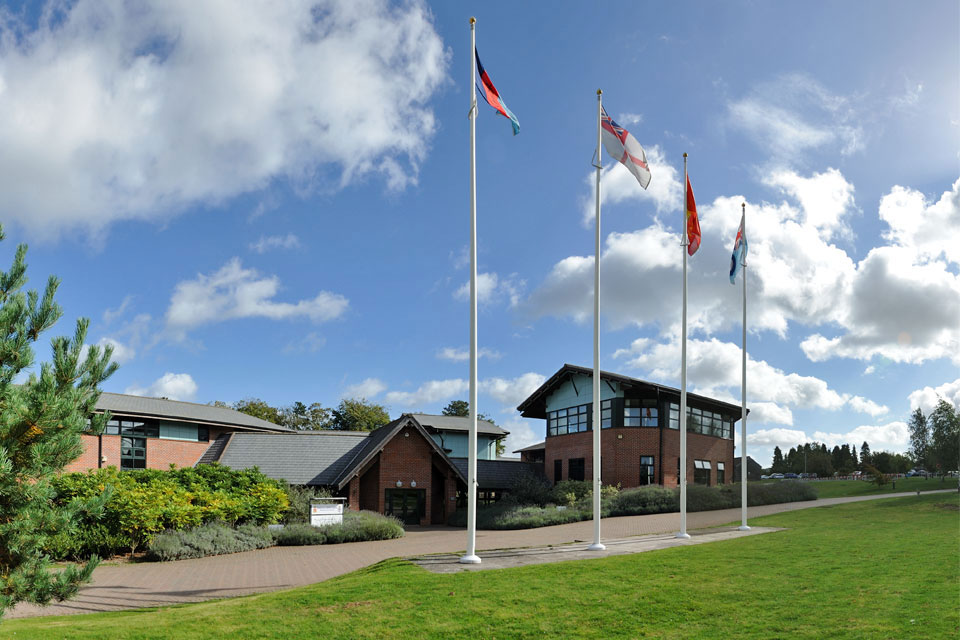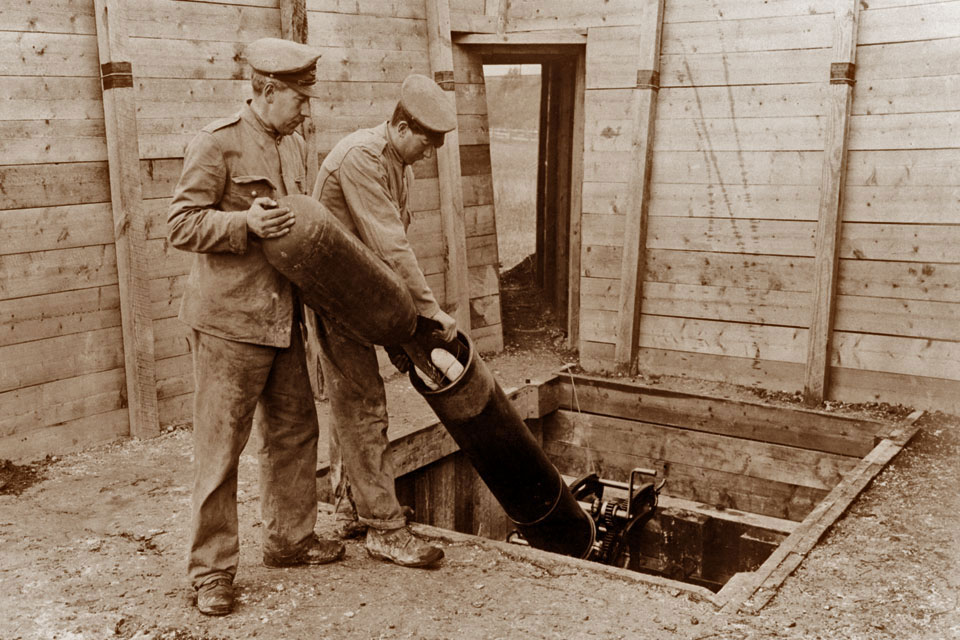Defence Chemical Biological Radiological and Nuclear Centre
Updated 27 February 2025

Defence CBRN Centre. All rights reserved.
Overview
The Defence Chemical, Biological, Radiological and Nuclear Centre (DCBRNC) delivers centralised Subsequent Trade Training (STT) to UK defence on behalf of the Land Warfare Centre (LWC).
The DCBRNC is located at Winterbourne Gunner in the Southwest of England, near Salisbury. The DCBRNC delivers training annually to roughly 1800 students (regular and reserve) on a range of specialist equipment, across 12 separate course events.
Instruction is delivered by DCBRNC trainers, either in Winterbourne Gunner or in other suitable exercise locations. The DCBRNC owns the quality assurance of all individual training delivered to defence. CBRN instruction is delivered by a specialist Instructor Cadre, the deep technical experts of UK defence.
A short history of the Defence CBRN Centre

World War 1 trench mortar. All rights reserved.
The DCBRNC site at Winterbourne Gunner was established in 1917 as a Trench Mortar Experimental Establishment under the administrative control of the war department’s ‘experimental ground’ at Porton Down. Known as Porton South Camp, it served as troop accommodation, ammunition store and as the trench mortar and artillery firing point.
The actual involvement of Winterbourne with chemical warfare dates back to the formation of the Chemical Warfare School in 1926. The school conducted training for officers and senior non-commissioned officers (SNCO’s), running courses and regular demonstrations for the services’ staff colleges and other dignitaries.
In 1931, the Chemical Warfare School became the anti-gas wing of the Small Arms School. In 1939 it gained independent status as the Army Gas School, later to be re-named as the Army School of Chemical Warfare. From 1947 to 1948, the school became a joint Army and Royal Air Force (RAF) establishment, named the Joint School of Chemical Warfare. The school taught the defensive aspects of nuclear warfare, and the importance of minimising the effects of nuclear weapons. Accordingly, the school was re-named as the Joint School of Nuclear and Chemical Ground Defence in 1957.
In January 1964, the title changed again to the Defence Nuclear, Biological and Chemical (NBC) School in recognition of the emerging threat posed by biological warfare. A further change was made in 1975 when it became the Defence NBC Centre. Following the 1987 Strategic Defence Review, the RAF assumed UK-lead service responsibility for NBC defence, and in 1999 the Defence NBC Centre became a RAF-administered unit within No. 2 Group.
The replacement of the site’s original World War 1 corrugated tin huts and wooden buildings was completed in 2005, with new messing facilities and state-of-the-art student accommodation. In the same year, the centre changed its name to the Defence Chemical, Biological, Radiological and Nuclear Centre to reflect the change in emphasis from cold war, NBC war-fighting, to defence against a wider asymmetric threat. In 2017 the Defence CBRN Centre celebrated 100 years of military training at Winterbourne Gunner.
Today’s DCBRNC has a purpose-built training complex with headquarters, administrative support elements, and the Defence CBRN School with lecture theatres and classrooms. To support the CBRN training, the Centre has a specialised range of scenario-based training facilities and modern troop accommodation. On 1 April 2019, the DCBRNC transferred from No. 2 Group RAF command to the Royal School of Military Engineering, Army command.
Counter CBRN (C-CBRN) courses - application criteria
Medical category (physical requirements)
Candidates training at DCBRNC must be in good health and be physically fit enough to complete the courses. Most of the training involves patrolling and running with weight while carrying all personal equipment.
UK students
Please contact WBN-DCBRNC-Sch@mod.gov.uk for more information and application details.
International students
A competent level of English is required to gain maximum benefit from the training. International students will need one of the following:
- International English Language Testing System (IELTS) - standard required: level 5.0
- NATO Standardisation Agency (STANAG) - standard required: level 2
- Common European Framework (CEP) - standard required: level B
- appropriate security clearance
Some courses may require multiple entry visas - international students should contact: lorna.shackleton558@mod.gov.uk for more information.
CBRN Defence Advisors’ Course
Overview
This course is aimed at military personnel within a formation HQ (Battalion/Brigade/Division) or deployed operating base who are responsible to the commander for the tactical planning and execution of CBRN defence measures and unit CBRN training.
Objectives
The course is designed to train CBRN Defence Advisors operating at SO2/SO3 level.
Eligibility
Commissioned Officers (OF 1–4) or Senior Non-Commissioned Officers (OR 7) filling a CBRN post.
Pre-requisite training/experience
A working knowledge of a (National) Combat Estimate/Planning Process. Experience of briefing up to SO1 level-1 Star level is beneficial.
Duration
2 weeks (8 working days).
CBRN Defence Cell Controllers (BRACIS) Warning and Reporting Course
Overview
This course is for military personnel who manage and carry out functions of CBRN warning and reporting in control or collection centres.
This course is not suitable for international students.
Objectives
The course is designed to train CBRN personnel in formation HQ in CBRN planning, data collection, warning and reporting.
Eligibility
Senior Non-Commissioned Officers (OR 5) filling a CBRN post.
Pre-requisite training/experience
UK Counter CBRN course and (Preferred) Staff/Formation HQ experience. Instructor or national equivalent.
Duration
4 weeks (20 working days).
Counter CBRN Individual Training Instructor Course
Overview
This course is for military personnel and civilian emergency service personnel who are tasked with delivering training to sub-units under direction of a CBRN Tactical Training Instructor, and to understand the requirements for UK in-service respirator maintenance and testing.
Objectives
The course is designed to train personnel to fit, repair and maintain the UK in-service respirator, deliver basic C-CBRN individual skills training and assist the unit CBRN Tactical Training Instructor in the delivery of Counter CBRN training and TTPs using current UK in-service sense equipment.
Eligibility
C-CBRN Junior Non-Commissioned Officers (OR 3 and above).
Pre-requisite training/experience
CBRN defence skills: basic CBRN survival skills and operating skills.
Duration
1 week (5 training days).
Counter CBRN Tactical Training Instructor Course
Overview
This course is for military personnel and civilian emergency service personnel who are tasked with delivering CBRN training to units/sub-units under direction of Formation Training Officers. Trained personnel are also qualified to provide Subject Matter Expert (SME) advice to defence advisors and commanders in the planning and execution of unit training and on operations.
Objectives
To train personnel to deliver CBRN training.
Eligibility
Junior non-commissioned officers (OR 4 and above).
Pre-requisite training/experience
Counter CBRN Individual Training Instructor Course.
Duration
2 weeks (10 training days).
Counter CBRN Clinical Course
Overview
This course covers the main CBRN hazards using the all-hazards approach and looks at medical support from point of exposure through to definitive hospital care at Role 3.
Objectives
To train pre-hospital and hospital personnel in recognition, triage and management of casualties in a CBRN environment and beyond as a team leader.
Eligibility
This course is intended for medical officers, nurses, and paramedics. Other healthcare professionals will be considered on a case-by-case basis.
Pre-requisite training/experience
Advance life support/battlefield trauma life support is desirable though not essential.
Duration
1 week (5 training days).
Counter CBRN Medic Course
Overview
This course is designed to train medical personnel in basic Role 1 management of CBRN casualties.
Objectives
To train pre-hospital personnel in recognition, triage and management of casualties in a CBRN environment.
Eligibility
This course is intended for pre-hospital nurse, paramedics and military medics. Other healthcare personnel will be considered on a case-by-case basis.
Pre-requisite training/experience
Immediate life support/battlefield trauma life support is desirable though not essential.
Duration
1 week (5 training days).
